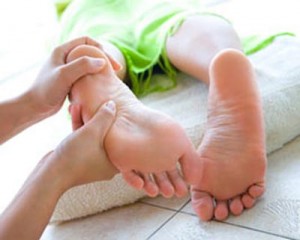
More evidence that low-calorie sweeteners are bad for your health
Studies show that artificial sweeteners can raise the risk of hypertension, metabolic syndrome, type 2 diabetes and heart disease, including stroke.

Natural Health News — A new study offers strong evidence that reflexology can help cancer patients manage their symptoms and perform daily tasks.
Carried out at Michigan State University rand funded by the US National Cancer Institute the study claims to be the is the first large-scale, randomised study of reflexology as a complement to standard cancer treatment.
Reflexology which has been practised since the time of the Pharaohs, is based on the idea that stimulating specific points on the feet can improve the functioning of corresponding organs, glands and other parts of the body.
Out of the fringe
“It’s always been assumed that it’s a nice comfort measure, but to this point we really have not, in a rigorous way, documented the benefits,” commented lead author Gwen Wyatt, a professor in the College of Nursing. “This is the first step toward moving a complementary therapy from fringe care to mainstream care.”
The study involved 385 women undergoing chemotherapy or hormonal therapy for advanced-stage breast cancer that had spread beyond the breast. The women were assigned randomly to three groups: Some received treatment by a certified reflexologist, others got a foot massage meant to act like a placebo, and the rest had only standard medical treatment and no foot manipulation.
The results are published in the latest issue of Oncology Nursing Forum.
The researchers surveyed the women about their symptoms at intake and then checked in with them after five weeks and 11 weeks.
They found that those in the reflexology group experienced significantly less shortness of breath, a common symptom in breast cancer patients. Perhaps as a result of their improved breathing, they also were better able to perform daily tasks such as climbing a flight of stairs, getting dressed or going grocery shopping.
Not just psychological
Wyatt said she was surprised to find that reflexology’s effects appeared to be primarily physical, not psychological.
“We didn’t get the change we might have expected with the emotional symptoms like anxiety and depression,” she said. “The most significant changes were documented with the physical symptoms.”
Also unexpected was the reduced fatigue reported by those who received the “placebo” foot massage, particularly since the reflexology group did not show similarly significant improvement. Wyatt is now researching whether massage similar to reflexology performed by cancer patients’ friends and family, as opposed to certified reflexologists, might be a simple and inexpensive treatment option.
Reflexology did not appear to reduce pain or nausea, but said Wyatt, that could be because the drugs for combating those symptoms are generally quite effective, so the women may not have reported them to begin with.
Although health researchers only recently have begun studying reflexology in a scientifically rigorous way, it’s widely practiced in many parts of the world and dates back thousands of years.
Ancient healing
“Reflexology comes out of the Chinese tradition and out of Egypt,” Wyatt said. “In fact, it’s shown in hieroglyphics. It’s been around for a very long time.”
Other, smaller studies have found that reflexology can treat health issues such as premenstrual tension as well as symptoms of anxiety and depression, even if they are associated with lung or breast cancer, nausea, vomiting, and fatigue in breast cancer patients and constipation and bowel control in children.
One larger study involving 71 patients with multiple sclerosis (MS) found that 11 weeks of reflexology was significantly better than calf massage in alleviating motor, sensory, and urinary symptoms.

Please subscribe me to your newsletter mailing list. I have read the
privacy statement